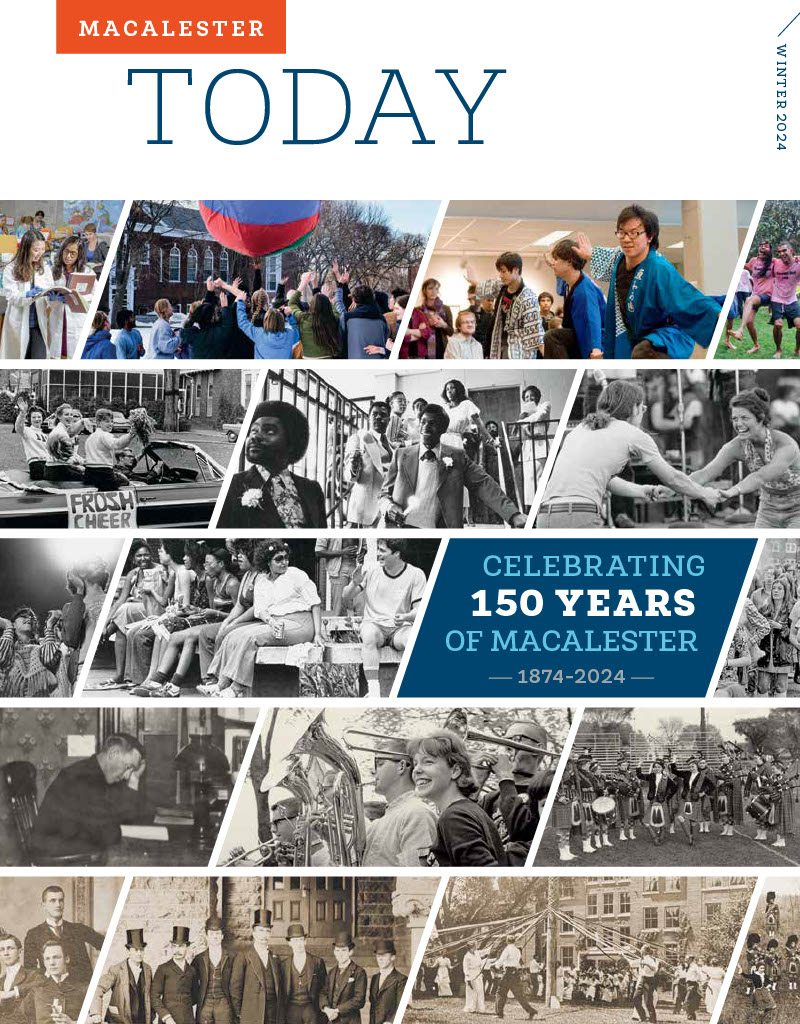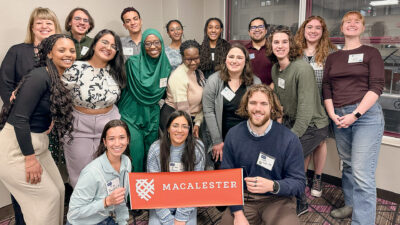
By Erin Peterson
Macalester’s Idea Lab on the library’s second floor is a bustling space: students map out ideas on dry-erase boards, flip through books on innovation, and talk energetically with one another around small tables. The lab opened in 2017 as home to the Department of Entrepreneurship and Innovation, and it’s where students go to take advantage of Macalester’s robust offerings on entrepreneurship, ranging from guest lectures by visiting alumni entrepreneurs to the ten-week MacStartups competitive business incubator program that helps students transform innovative ideas into reality.
There’s no question that entrepreneurial thinking is having a moment, particularly among young people. A Junior Achievement USA national survey published in 2022 found that 60 percent of teens are more interested in starting their own business than working a traditional job.
At Macalester, students are encouraged to pair their entrepreneurial drive with a grounding in the liberal arts, says Jody Emmings, director of entrepreneurship and innovation. Some fifty-three classes from seventeen disciplines have used the Idea Lab to help students pursue innovative thinking in their coursework. “When students have ‘aha’ moments in the classroom, we give them opportunities to explore questions and pursue experiential learning opportunities,” says Emmings. In the 2022-23 academic year alone, that included 135 classes, workshops, and events in the Idea Lab, with twenty-seven faculty partners representing twenty different departments. Nearly 1,800 students visited the Idea Lab as part of their coursework.
The point, she says, is not necessarily for students to launch the next billion-dollar company (though she does encourage students to aim high). It is instead to help them build skills that will benefit them long beyond their time on campus. “Students who are graduating in an uncertain world cannot easily predict their future, so they need to know how to create it,” she says. “Through entrepreneurship and innovation programming, students are able to generate and test their ideas to create something that does not yet exist. The learning that happens in the experimenting, practicing, and reflecting helps them build the entrepreneurial mindset and courage that allows them to build the future they want.”
To see how these lessons play out beyond Macalester, we asked seven young alumni who have participated in entrepreneurship and innovation programming to share what they learned—and how those lessons continue to resonate years later.
Rachel Stromsta ’19
How It Started
Rachel Stromsta had been interested in social justice issues even before she arrived at Macalester. So when she learned about the Introduction to Social Entrepreneurship course, she enrolled. “The focus on the process of building and facilitating growth in nonprofits stood out to me,” she says.
The class led her to intern for a semester with a local advocacy organization on criminal justice reform initiatives, including around meaningful employment opportunities. Then, she joined MacStartups to support efforts to combat hiring bias and structural barriers in the Twin Cities. In her final year at Macalester, she worked with Lutfe-E-Noor Rahman ’18 on a Live It Fund project that addressed the challenge of unsafe travel to school for girls in Bangladesh.
The work required her to design proposals, craft budgets, and collaborate with others who had different perspectives and ideas. “These were all components of Macalester’s entrepreneurship program that challenged me to think creatively,” she says.
How It’s Going
Stromsta, who earned her degree in political science with a concentration in human rights and humanitarianism, was most recently a program officer for the National Democratic Institute for International Affairs, a nonprofit, nonpartisan organization, headquartered in Washington, D.C., that works to support and strengthen democratic institutions worldwide. She has supported the Institute’s programs to promote peaceful and inclusive democratic processes, including through an international election observation mission for Nigeria’s 2023 presidential polls.
The mix of academic courses and entrepreneurial programming Stromsta took at Macalester has helped her develop in her career. She appreciates what she learned in her academic coursework, and regularly uses the skills from her entrepreneurship experiences: taking initiative, collaboration, and networking to get support. “So much of my work in MacStartups and the Live It Fund have instilled a drive to keep learning in my career.”
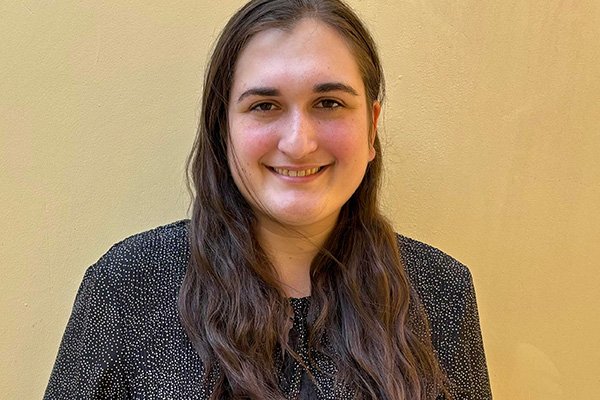
Zach Jordan ’22
How It Started
Eye movement desensitization and reprocessing (EMDR) is a therapy technique that’s commonly used to treat trauma-related disorders—but that has typically relied on clunky physical technology. When Zach Jordan experienced the technique with a therapist in high school, he suspected that software tools might be a better solution.
He built a simple first version, EasyEMDR, for him and his therapist to use, then put it out on the internet in 2016 for anyone who wanted it. The demand for the tool, which is designed to lead patients to move their eyes in specific ways while processing traumatic memories, quickly grew to more than he could handle. “My intention wasn’t to build a company,” he says.
But while Jordan was at Mac, he decided to take an introductory entrepreneurship course with [former director and entrepreneur in residence] Kate Ryan Reiling ’00. “Kate was very good at pushing people to get started on an idea and follow through on it,” he says. “She made me realize that turning my work into a business and scaling it up could help me build a better tool with more infrastructure—which would ultimately be beneficial for end users.”
How It’s Going
Jordan’s company grew steadily for years—until March 2020, when COVID-19’s stay-at-home orders led to explosive growth as therapy appointments moved online. Today, he leads a team of contractors to support the software, which is used by more than 10,000 therapists.
Jordan says he is particularly proud that he has embedded his own values into the company’s DNA. “We donate a minimum of 10 percent of all of our profits to charity, we give [the tool] away for free to anyone who can’t afford it, and we use our platform to talk about social issues that create trauma in the world,” he says. “Our goal is about more than creating great EMDR tools—it’s to address trauma more broadly.”
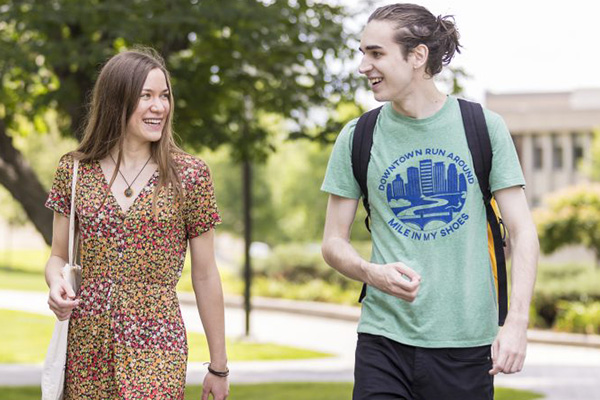
Kiante Miles ’20
How It Started
Slam poetry—a combination of poetry and performance—had always been a way for Kiante Miles to articulate his most complicated feelings about the world. He found particular solace in the art after he arrived at Macalester, which felt politically and culturally distinct from his Oklahoma home. Miles wanted to introduce other young people to the art form that helped him process his emotions.
With the help of the Live It Fund and MacStartups, he developed “Stay Woke Poetry,” a program that taught the basic skills of slam poetry to high school students in Minnesota and Oklahoma. He helped students write and perform their own poems, which also were compiled and published in a physical book.
Miles says that the work taught him the importance of building something that was designed to last. “It was never about ‘How do I get rich quick?’” he says. “It was about coming up with creative solutions to complex problems, having a moral compass, and creating something sustainable.”
How It’s Going
Now a data engineer at Hagerty, a membership organization for car lovers, Miles has maintained an entrepreneurial mindset. He recently started his own company on the side, Miles of Art, which is designed to support and grow the Black presence in digital careers, whether that’s graphic art or software engineering. It’s a need he’s seen firsthand since entering the workforce.
He launched the endeavor with the same care he did with his slam poetry ventures, including an eye toward making impact now—and carefully managing his funding and energy so that he can continue to do so for years to come. “Macalester was great at instilling a sense of care about others,” he says. “My goal is to put [this venture] in a good place so I can help a lot of people not just now, but ten years from now.”
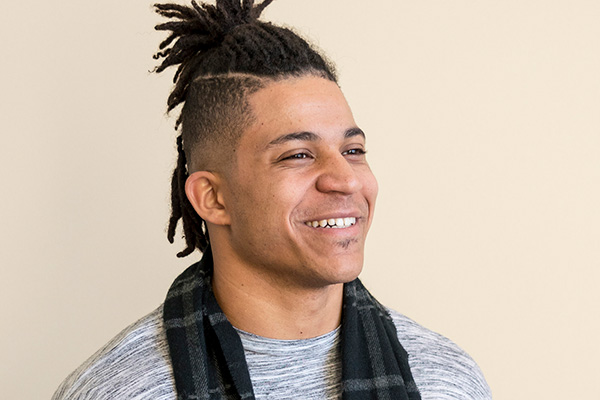
Juliette Myers ’17
How It Started
When Juliette Myers decided that she wanted to pursue a career as an artist, she knew she’d need more than just talent to succeed. “It required understanding entrepreneurship and business,” she says. “That led me to MacStartups.”
Through the ten-week program, Myers worked with Twin Cities artist Baki Porter to develop an art collective: a group of artists who ultimately came together for a one-time performance art event that included rap, dance, and poetry.
The work for MacStartups focused on the methodical process of taking an idea from concept to reality. Myers says that one of the steps that had an immediate impact was an assignment to talk to dozens of people working in a similar field to learn how to find funding and strengthen her skills as an artist. “I ended up interviewing more than fifty people connected to the arts, and they also connected me to other artists,” she says. “It was a huge way for me to network and meet more people in the arts community.”
How It’s Going
As a public artist, muralist, and mosaic artist, Myers continues to benefit from her MacStartups experience. Many of the skills she honed as a student—including developing sharp pitches to describe her ideas, values, and approaches—continue to benefit her.
But even more than that, she’s tried to model the kind of generosity that she experienced from alumni and artists when she was first learning about the field. “Today, I have people who want to talk with me about the arts community, and I’m happy to do that,” she says. “I learned how important it is to be generous with your time and information. Building relationships is at the core of this work.”
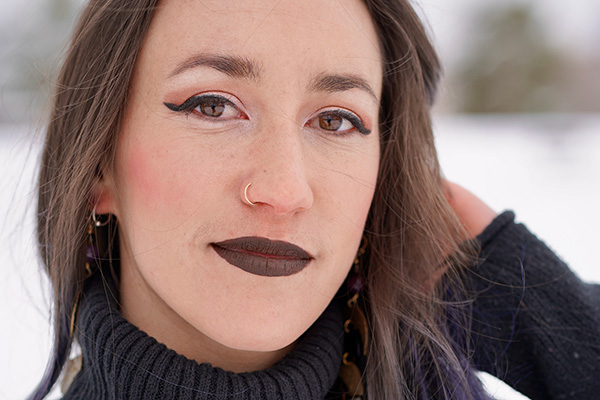
Lilian Vo ’18
How It Started
Lilian Vo joined the board of the Live It Fund on a whim as a first-year student. Eventually, reading applications for students who wanted to pursue ambitious projects through the fund inspired her to devise her own.
Her junior year, she landed a grant to create The Sticky Rice Project, which used cooking, writing, and reflective workshops to build connections among different generations of the Vietnamese community in Seattle, where Vo grew up. The project, which included a print magazine component, connected her interest in her home city with her fascination with design. “I’m a designer through and through,” she says. “I wanted to go beyond ideas to create something that was real and tangible.”
While Vo never thought of herself explicitly as an entrepreneur, she did think of herself as creative; she went on to pursue other entrepreneurial programs including Macathon and frequently spent time in the Idea Lab. “The Idea Lab gave me space to be creative and collaborative,” she says.
How It’s Going
Sticky Rice led Vo directly to her current job at The On Being Project, an organization that produces podcasts, events, and tools to help people think about what it means to be human.
The art director at The On Being Project at the time came across Vo’s online portfolio, which included The Sticky Rice Project, and reached out. “I remember she said something along the lines of ‘Oh, so you’re an art director,’” Vo recalls. “It was cool to have a professional give words to what I was doing.”
Today, Vo herself is the organization’s senior art director, where she creates a variety of materials for the website and social media, and collaborates with illustrators and photographers. She says she still leans on the experimental mindsets that she developed in her entrepreneurial programs at Macalester. “You have to try a lot of things to know if they’re going to work. You’ve got to keep working and keep testing.”
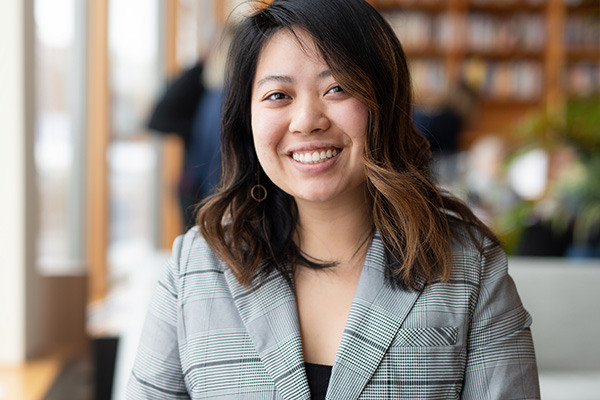
Cuauhtémoc Cruz Herrera ’19
How It Started
Growing up in Mexico, Cuauhtémoc Cruz Herrera was an eager participant in Math Olympiad, a team-based competition that fosters mathematical thinking. But even as he excelled, he worried about the competition’s flaws: “Most of the students were private school students—there were few opportunities for public school students like me,” he recalls.
While he was still in high school, he started working with public schools to help them get access to the competition. When he arrived at Macalester, he realized the Live It Fund could help him scale the work further. With the funding, he was able to work with more schools in Mexico to expand access to Math Olympiad experiences. It ended up reaching some 500 students.
Cruz Herrera says he benefited not just from the funding, but from advice he got from the Mac community during the process. “I would go to the entrepreneurship office to just chat with them about my project,” he recalls. “They gave me so much mentorship support,” he says.
How It’s Going
Today, Cruz Herrera is the director of exact sciences and mental skills for the Department of Education in Mexico’s state of Jalisco. He oversees a portfolio of programs and activities linked to
entrepreneurship, mathematics, and STEAM for teachers and students. He leads a team of more than fifty who have an impact on more than 100,000 students annually. “In many ways, much of my work is the same as what I was doing at Macalester, but a thousand times bigger,” he says.
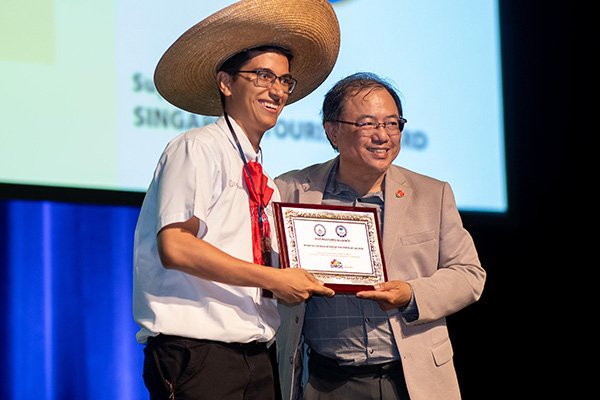
Jonah Kaplan ’16
How It Started
Jonah Kaplan loved the idea of being part of a team focused on making an impact in the world. When he had the chance to run the MacStartups program with Zach Willert ’17, one year after its founding by Petar Petrovic ’14, he jumped at the opportunity. “I began to believe that a for-profit business could be used to effect positive change,” he says. “MacStartups put me together with an interesting group of people, and on an exciting new path.” They aimed to build a program that leaned into liberal arts values and the unique challenges of launching a business. “There were people in the program from all different backgrounds and disciplines—political science, environmental science, math,” he says. “Having a deep expertise in a discipline unrelated to business can be a huge advantage.”
They also aimed to help build a community for the fledgling founders—both with fellow students, as well as alumni experts and the wider entrepreneurial community. “Being a startup founder is a lonely journey,” he says. “It’s really about the support you get from others along the way.”
How It’s Going
Today, as the head of platform at early-stage venture capital firm BlueYard Capital, Kaplan sees parallels to the work he once did at Macalester. “A startup requires incredible will from a founder—as an outside supporter and investor, your job is to offer resources and support to keep them going,” he says. “At MacStartups, that was a small stipend, a supportive alumni network, and a cohort of like-minded students. Now, the scale and stakes are higher, but the exact same principles apply.”
Kaplan continues to lend a hand to the MacStartups program through a variety of volunteer efforts, including attending pitch feedback events. At some point, he hopes he’ll be more than just an advisor for today’s students. “My dream would be that at some point, BlueYard has the chance to invest in the work of Macalester alumni,” he says.
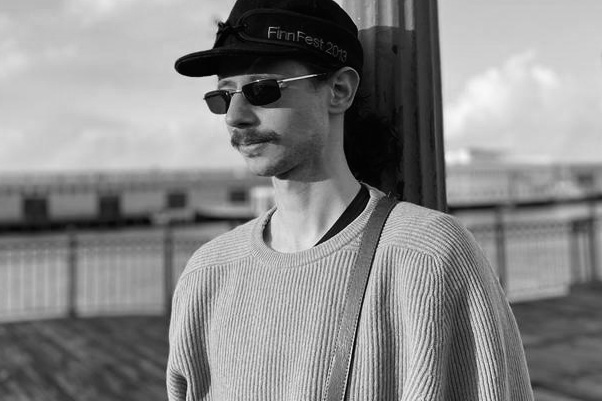
Erin Peterson is a Minneapolis-based writer.
February 15 2024
Back to top